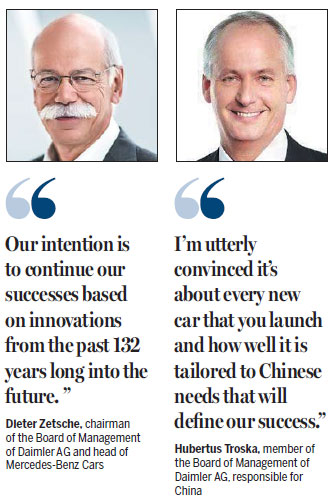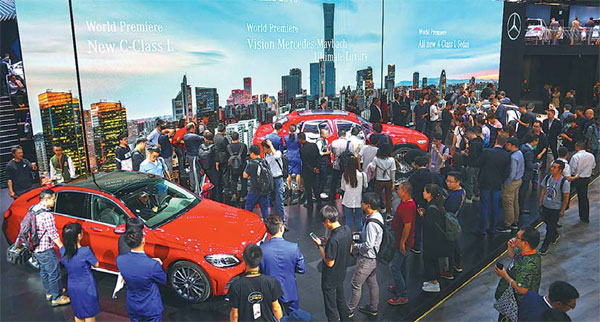Daimler focuses on meeting growing needs of Chinese customers
German automaker Daimler AG has achieved numerous milestones in China over the last year, from record sales for its Mercedes-Benz brand, to announcements of production expansions.
On the sideline of this year's Auto China, Dieter Zetsche, chairman of the Board of Management of Daimler AG and head of Mercedes-Benz Cars, and Hubertus Troska, member of the Board of Management of Daimler AG responsible for China, sat down with Chinese reporters to discuss the exciting opportunities provided by China's rapidly changing automotive landscape.
"The main objective is to stay in the position we are in today, which is a leadership position in our part of the automotive industry," said Zetsche, adding that Daimler's focus is clear. "Whatever we do, we do not for its own sake, but towards that objective."
|
Mercedes-Benz models on display attract throngs of car enthusiasts. Photos Provided to China Daily |
As the largest single market for Mercedes-Benz Cars since 2015, China has become increasingly important for the Stuttgart-based automaker, with over 600,000 cars delivered to its Chinese customers last year, the first time in the company's history that number has been achieved in a single market.
"We have gradually and step-by-step improved our setup in China, strengthening our relationship with BAIC, which I believe is very good," Troska said.
Faced with increasing demand for its locally produced models, the relationships the company has built with its local partners are becoming more and more important.
In February, Daimler and BAIC announced plans to expand their production through their local production hub, Beijing Benz Automotive Co Ltd, investing over 11.9 billion yuan ($1.88 billion), according to Xinhua News Agency.
In addition to BAIC, Daimler maintains a close partnership with new energy vehicle manufacturer BYD through their joint venture for the all-electric DENZA vehicle.
"We believe there is a lot of further potential here, so I think we are starting with a solid basis of cooperation with the two partners, and this will continue," Troska said.
Building on this foundation will be vital for Daimler given the rapid changes facing the auto market, particularly in China, according to the company.
"Continuing to do what went well yesterday, you cannot win the future," Zetsche stressed. "Our intention is to continue our successes based on innovations from the past 132 years long into the future."
The company said its success in this may hinge on its ability to meet the upcoming opportunities brought by a continually innovating business environment.
Daimler said it is looking to its strategy focusing on connectivity, autonomous driving, and shared driving and electric to fuse the main themes of these radical changes radiating through the industry, transforming the car into a platform for a multitude of technologies.
"Connectivity, autonomous driving, sharing, and electric vehicles are the cornerstones of these future technological developments," Zetsche said.
The goal is clearly leadership in these important fields, as showcased by the company's new MBUX intelligent connectivity system, which combines artificial intelligence with a more human-centered, intuitive experience.
"We do believe that the general public expects Mercedes to be a leader, and lead these developments into the future. And that is our objective," Zetsche said.
Daimler is backing up this drive into new technologies with substantial investments.
"We have increased our spending in research and development and capital expenditures significantly to 14 billion euros ($17 billion) only for Mercedes-Benz this year, compared to about 8 billion euros only a few years ago," Zetsche added.
Investment in technology is just one way that Daimler is looking to the future. Through programs like Leadership 2020, the company looks to bring a more startup spirit into their 132-year-old organization.
"We are investing a lot into a profound change of the culture in our company," Zetsche said. "I am glad to see many areas in the company where we are working in totally different ways, becoming more innovative, and therefore being prepared to deal with challenges."
This startup mindset has been particularly important to the company's new energy vehicle development.
Daimler was an early entrant into China's electric mobility market, pioneering in the field through its joint venture DENZA brand together with local partner BYD.
"China is clearly going electric, in line with our global development of electric cars," Troska said. "The policies are in place, the vision is there, so I have no doubt that China will continue to grow at a fast pace in terms of new energy vehicles."
According to the Chinese Association of Automobile Manufacturers, around 777,000 electric and hybrid cars were sold in China last year, with the number expected to exceed 1 million this year.
Daimler's investments in new energy vehicles have continued this year, and next year will also see a new electric model roll out from its joint venture BBAC.
"The EQC will be the first locally produced Mercedes-Benz electric car," Troska said. "There will be more products to come. Clearly new energy vehicles are a trend that we are investing in.
"We have stated for the year 2025 we see a global share between 15 and 25 percent for total production of pure new energy vehicles."
As seen with the world premiere of the all-new A-Class L sedan at Auto China 2018, Daimler's focus on meeting the needs of its Chinese customers also remains a key aspect of their China commitment, the company said.
"I'm utterly convinced it's about every new car that you launch and how well it is tailored to Chinese needs that will define our success," Troska said. "We believe we did something with the long wheelbase that none of our competitors have done in the segment."
This firm dedication to China looks only to deepen going forward. "Stay put - we will invest more in China and in new models especially for China," he added.
Zetsche is optimistic that Daimler will be able to take full advantage of the opportunities that a developing automotive market presents. "We are not arrogant, but are confident that we will be able to compete in this wider competitive field," Zetsche said.

(China Daily 04/26/2018 page7)















